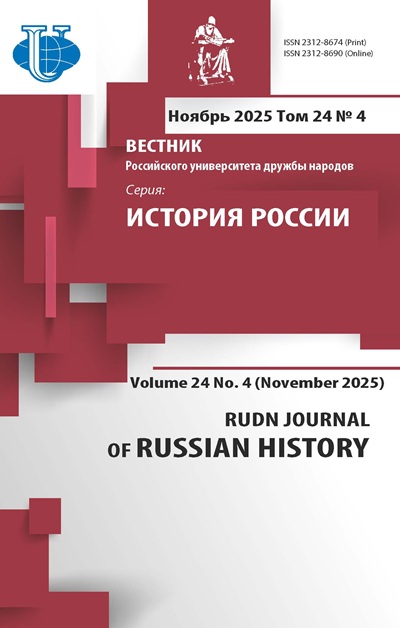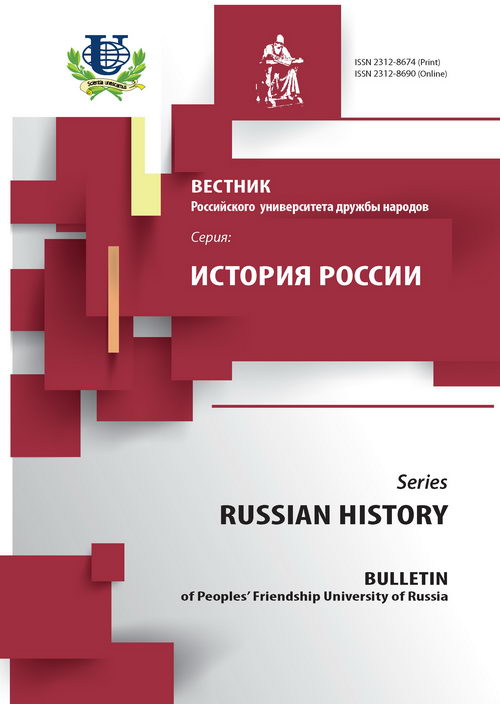«Три бубенщика, два транзелиста, два бунчука»: трансформация культурной повседневности казачьих станиц Юга России в 1930-е гг.
- Авторы: Скорик А.П.1, Самсоненко Т.А.2
-
Учреждения:
- Южно-Российский государственный технический университет(Новочеркасский политехнический институт)
- Сочинский государственный университет туризма и курортного дела
- Выпуск: № 3 (2009)
- Страницы: 121-131
- Раздел: СТАТЬИ
- URL: https://journals.rudn.ru/russian-history/article/view/3849
- ID: 3849
Цитировать
Полный текст
Аннотация
В работе анализируются процессы преобразования и развития культурно-бытовой сферы казачьих станиц Юга России в условиях «колхозного строительства» на протяжении 1930-х гг. Освещено негативное влияние форсированной коллективизации на казачью повседневность. Выявлены и рассмотрены позитивные тенденции, доминировавшие в сфере культуры и быта донских, кубанских, терских казаков в результате организационно-хозяйственного укрепления колхозной системы, наблюдавшегося во второй половине 1930-х гг.
Об авторах
Александр Павлович Скорик
Южно-Российский государственный технический университет(Новочеркасский политехнический институт)Кафедра теории государства и права и отечественной истории; Южно-Российский государственный технический университет(Новочеркасский политехнический институт)
Татьяна Александровна Самсоненко
Сочинский государственный университет туризма и курортного делаКафедра туризма и курортного дела; Сочинский государственный университет туризма и курортного дела
Список литературы
- Давыдов Ю. «Красный терец» (о колхозе ст. Ново-Павловской, Георгиевского района). - Ростов н/Д., 1931
- Радин А.Е., Годович Е.А. Советские казаки. - Ростов н/Д., 1938
- Лащилин Б. Станица Михайловская на Хопре. - Сталинград, 1939
- Лукин Б.В. К истории донского казачества. - Ростов н/Д., 1939
- Гайдаш Н. Калиновский колхоз «15 лет Октября». - Пятигорск, 1940
- Корчин М.Н. Донское казачество (Из прошлого). - Ростов н/Д., 1949
- Ленинский путь донской станицы / Под ред. Ф.И. Поташева, С.А. Андронова. - Ростов н/Д., 1970
- Кофанов П. Земля в походе // Наши достижения. - 1930. - № 4. - С. 32.
- Государственный архив Ростовской области (ГАРО). - Ф. Р-2573. - Оп. 1. - Д. 127. - Л. 14.
- Центр документации новейшей истории Ростовской области (ЦДНИ РО). - Ф. 166. - Оп. 1. - Д. 114. - Л. 90.
- Там же.
- Там же. - Л. 41.
- Там же. - Л. 41-42, 43.
- Там же. - Ф. 8. - Оп. 1. - Д. 31. - Л. 39 об.
- ЦДНИ РО. - Ф. 8. - Оп. 1. - Д. 31. - Л. 50 об - 52.
- ЦДНИ РО. - Ф. 166. - Оп. 1. - Д. 100. - Л. 56.
- ГАРО. - Ф. Р-1390. - Оп. 7. - Д. 442. - Л. 34 об.
- Из статьи секретаря Ивановского райкома ВКП(б) Азово-Черноморского края В. Ухова в газете «Молот» о победе социалистического уклада жизни в кубанской станице // Коллективизация сельского хозяйства на Северном Кавказе (1927-1937 гг.). Документы и материалы / Под ред. П.В. Семернина и Е.Н. Осколкова. - Ростов н/Д., 1972. - С. 681.
- Котов Г., Струков М., Горбатенко Г., Френкель Я. Советская деревня к третьей пятилетке // Социалистическое сельское хозяйство. - 1939. - № 5. - С. 149.
- Статистические данные о состоянии просвещения, культуры, здравоохранения [Краснодарского] края в 1937-1939 годах // Краснодарский край в 1937-1941 гг. Документы и материалы / Гл. ред. А.А. Алексеева. - Краснодар, 1997. - С. 525
- Справка о состоянии культпросветы работы в крае. 1940 г. // Там же. - С. 534.
- Шолохов М.А. Из речи перед избирателями Новочеркасского избирательного округа // Шолохов М.А. Собрание сочинений в восьми томах. - М., 1975. - Т. 8. - С. 65.
- Лучина С.Ф. Мои впечатления о поезде в Вешенскую // Михаил Шолохов в воспоминаниях, дневниках, письмах и статьях современников: в 2 кн. / Сост., вступ. ст., коммент., примеч. В.В. Петелина. - М., 2005. - Кн. 1: 1905-1941 гг. - С. 572.
- Чилим И. Станица // Орджоникидзевская правда. - 1937. - 24 октября.
- Там же.
- Там же.
- В казачьих колхозах // Северо-Кавказский большевик. - 1936. - 27 октября
- Чилим И. Станица на Тереке. Колхозная Калиновка // Северо-Кавказский большевик. - 1936. - 22 декабря.
- Театр казачьей молодежи // Михаил Шолохов в воспоминаниях... - С. 536.
- Шолохов М.А. Речь по поводу двухлетия Вешенского казачьего театра // Шолохов М.А. Собр. соч. в 8 т. - М., 1975. - Т. 8. - С. 73.
- Ерохин А. Вешенские казаки в Москве // Михаил Шолохов в воспоминаниях... - С. 521-522.
- ЦДНИ РО. - Ф. 76. - Оп. 1. - Д. 62. - Л. 42 об, 43.
- Там же. - Ф. 9. - Оп. 1. - Д. 178. - Л. 14, 14 об.
- Там же. - Ф. 76. - Оп. 1. - Д. 30. - Л. 104.
- Там же. - Д. 29. - Л. 24, 78.
- Там же. - Д. 30. - Л. 131, 141; Д. 56. - Л. 61, 62.
- Там же. - Л. 104.
- Там же. - Ф. 9. - Оп. 1. - Д. 14. - Л. 206.
- Мар Н., Бусыгин А. Хутор Лебяжий // Молот. - 1937. - 9 октября.
- ЦДНИ РО. - Ф. 9. - Оп. 1. - Д. 14. - Л. 245.
- ГАРО. - Ф. Р-2443. - Оп. 2. - Д. 647. - Л. 41.
- Кирсанов Е.И., Пониделко А.В. Новочеркасск - столица мирового казачества: История и современность. - М., 2008. - С. 501.
Дополнительные файлы















